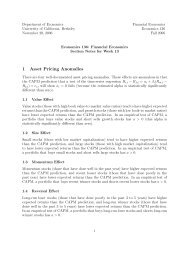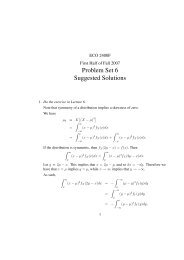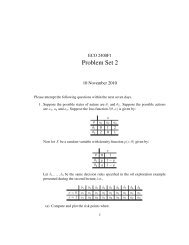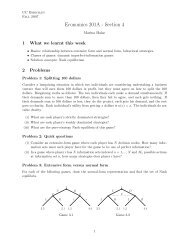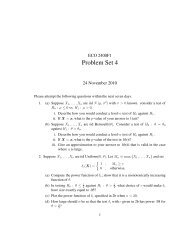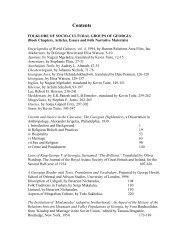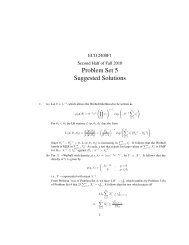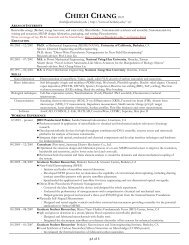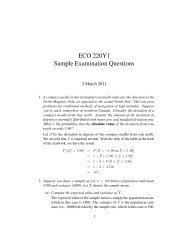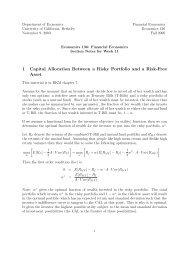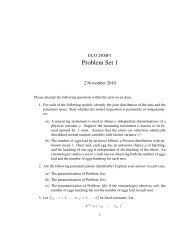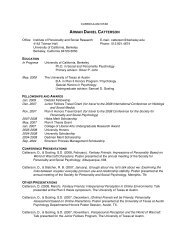A Context for Bela Bartok on the Eve of World War II: The Violin ...
A Context for Bela Bartok on the Eve of World War II: The Violin ...
A Context for Bela Bartok on the Eve of World War II: The Violin ...
Create successful ePaper yourself
Turn your PDF publications into a flip-book with our unique Google optimized e-Paper software.
epercussi<strong>on</strong>s Spring-Fall 1996<br />
<strong>the</strong> specifics, however, <strong>the</strong> main point, <strong>the</strong> last sentence<br />
(quoted above), was <strong>the</strong> <strong>on</strong>ly <strong>on</strong>e completely highlighted in<br />
boldface in <strong>the</strong> March 1934 publicati<strong>on</strong>.<br />
While Bart6k c<strong>on</strong>tinued to paint his relati<strong>on</strong>ship with<br />
various Hungarian authorities in grim t<strong>on</strong>es <str<strong>on</strong>g>for</str<strong>on</strong>g> some time,<br />
<strong>the</strong> publicati<strong>on</strong> <strong>of</strong> "Our Folk Music and <strong>the</strong> Folk Music <strong>of</strong><br />
Neighboring Peoples" appears to have planted seeds in a<br />
newly fertile soil that would eventually produce <strong>the</strong> greatest<br />
appreciati<strong>on</strong> <str<strong>on</strong>g>for</str<strong>on</strong>g> Bart6k's work in Hungary during his<br />
lifetime.27 <strong>The</strong> first sign <strong>of</strong> this change was his transfer to<br />
<strong>the</strong> Academy <strong>of</strong> Sciences, which, although he had applied<br />
<str<strong>on</strong>g>for</str<strong>on</strong>g> it several years in a row, was finally approved <strong>on</strong> 27 July<br />
1934, just four m<strong>on</strong>ths after <strong>the</strong> appearance <strong>of</strong> "Our Folk<br />
Music and <strong>the</strong> Folk Music <strong>of</strong> Neighboring Peoples."<br />
In spite <strong>of</strong> <strong>the</strong> ir<strong>on</strong>y <strong>of</strong> Bart6k withdrawing from <strong>the</strong><br />
politics around him by focusing <strong>on</strong> what was <strong>the</strong> most politically<br />
charged aspect <strong>of</strong> his work, and in spite <strong>of</strong> <strong>the</strong> fact<br />
that Bart6k seems to have had enough feel <str<strong>on</strong>g>for</str<strong>on</strong>g> politiCs to<br />
win himself <strong>the</strong> possibility <strong>of</strong> doing <strong>the</strong> work he loved, it<br />
would be a mistake to regard Bart6k's folk-music research<br />
itself as having been c<strong>on</strong>ducted in <strong>the</strong> service <strong>of</strong> a Hungarian<br />
nati<strong>on</strong>alist agenda.28 To <strong>the</strong> end <strong>of</strong> his life, Bart6k<br />
26. <strong>The</strong> essay was originally published as a separate volume <strong>of</strong> <strong>the</strong> series<br />
Nepszerii zeneJUzetek (Popular music notebooks), no. 3, ed. Antal Molnar;<br />
reprinted in <str<strong>on</strong>g>Bartok</str<strong>on</strong>g> <str<strong>on</strong>g>Bela</str<strong>on</strong>g> osszegyujtott iTiisai I, ed. Andras Szol1osy<br />
(Budapest: Zenemukiado, 1966), 403-61. <strong>The</strong> passage quoted is <strong>the</strong> last<br />
passage in a versi<strong>on</strong> dated 15 January 1934. <strong>The</strong> March publicati<strong>on</strong> includes<br />
a postscript based <strong>on</strong> <str<strong>on</strong>g>Bartok</str<strong>on</strong>g>'s just-completed research in<br />
Bucharest that he implies fur<strong>the</strong>r streng<strong>the</strong>ns his findings regarding <strong>the</strong><br />
unique qualities <strong>of</strong> Hungarian folk music.<br />
27. On 28 April 1934, in a letter to a German acquaintance who had requested<br />
assistance in arranging c<strong>on</strong>certs in Hungary, <str<strong>on</strong>g>Bartok</str<strong>on</strong>g> reported<br />
wryly: "1 un<str<strong>on</strong>g>for</str<strong>on</strong>g>tunately have no influence . [in Hungary]: my relati<strong>on</strong>s<br />
with <strong>the</strong> Opera are very bad, with Hubay [director <strong>of</strong> <strong>the</strong> Academy <strong>of</strong><br />
Music] utterly bad, with Dohnanyi [c<strong>on</strong>ductor <strong>of</strong> <strong>the</strong> Philharm<strong>on</strong>ic<br />
Society] very chilly, with <strong>the</strong> government quite bad, and I am just <strong>on</strong> <strong>the</strong><br />
verge <strong>of</strong> having a quarrel with <strong>the</strong> Radio, though we have never been <strong>on</strong><br />
particularly friendly terms." <str<strong>on</strong>g>Bartok</str<strong>on</strong>g> <str<strong>on</strong>g>Bela</str<strong>on</strong>g> levelei, 479.<br />
37



